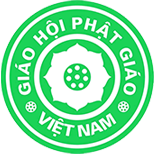NATIONAL VIETNAM BUDDHIST SANGHA

In the history of Vietnamese Buddhism in the modern era, with the Buddhist policy of accompanying the nation, the Buddhist organizations of Vietnam have previously attempted to unify Buddhism five times. Each time of unifying Buddhism, whether within a region or nationally, has the same goal of building a strong national Buddhism. The Vietnam Buddhist Sangha, founded in 1981 and fully developed today, is the inevitable result of that historic process.
After the unification of the country on April 30, 1975, once again the need for national unity of Buddhism was raised. After nine rounds of campaigning, the Campaign Organizing Board for the Unification of Buddhism was established with the participation of nine Buddhist organizations and Buddhist Congregation.
In the history of Vietnamese Buddhism in the modern era, with the Buddhist policy of accompanying the nation, the Buddhist organizations of Vietnam have previously attempted to unify Buddhism five times. Each time of unifying Buddhism, whether within a region or nationally, has the same goal of building a strong national Buddhism. The Vietnam Buddhist Sangha, founded in 1981 and fully developed today, is the inevitable result of that historic process.
After the unification of the country on April 30, 1975, once again the need for national unity of Buddhism was raised. After nine rounds of campaigning, the Campaign Organizing Board for the Unification of Buddhism was established with the participation of nine Buddhist organizations and Buddhist Congregation.
From November 4-7, 1981, the first National Assembly of Buddhist Representatives was held in Quan Su Temple, Hanoi, with the participation of 165 delegates from 9 organizations and religions. Various associations have officially come to establish a single Buddhist Congregation called Vietnam Buddhist Sangha. Most of the faithful who have contributed to the forming of the Congregation have passed away.
Vietnam Buddhist Sangha consists of:
-
The Vietnamese United Buddhist Sangha.
-
The United Vietnamese Buddhist Association
-
The Vietnamese Traditional Buddhist Sangha.
-
The Ho Chi Minh City Buddhist Liaison Committee
-
The Vietnamese Original Buddhist Sangha
-
The Thien Thai School Sangha
-
The Vietnamese Mendicant Monks Buddhist Sangha
-
The Southern Patriotic Clergy Solidarity Association
-
The Vietnamese Buddhist Study Association
At present, Vietnam Buddhist Sangha has two main Councils :
1/ the Supreme Patriarch Council consisting of 96 respected senior monks led by the Supreme Dhamma Patriarch, His Holiness Most Venerable Thich Pho Tue, the spiritual leader
2/ The Executive Council consisting of 270 members led by the President, the Most Venerable Thich Thien Nhon to execute all the administration and management of the Sangha
According to the Charter, the Supreme Patriarch Council is the supreme authority on the Doctrine (Dhamma) and the Precepts (Vinaya) of the Vietnam Buddhist Sangha. The Supreme Patriarch Council assigns its Standing Committee to perform the functions and duties of the Supreme Patriarch Council between the two National Assemblies of Buddhist Delegates; supervise and attest the Buddhist activities of all levels of the Sangha. The Supreme Patriarch Council of the Sangha consists of the typical Venerable Monks of the Vietnam Buddhist Sangha; at least 70 years old and 50 years old whom are inntroduced by the Standing Committee of the preceding Council and by National Assembly of the Vietnam Buddhist Sangha's acknowledgement
The Executive Council is the highest administrative and executive organization of the Vietnamese Buddhist Sangha in all aspects of operation between two terms. The Executive Council is the only authority to hold the broadcasting and speaking right of the Vietnam Buddhist Sangha, which is responsible for the content of the speeches and announcements by agencies and individuals in the Vietnam Buddhist Sangha. managing information and communication activities related to the Vietnam Buddhist Sangha; is responsible to coordinate with the competent secular state agencies in dealing with dissenting organizations, individuals, communication and information whose contents are inaccurate, distorted or lack of objectivity related to the Vietnam Buddhist Sangha and all levels and members of its branches.
The Vietnamese Buddhist Sangha has 13 central committees in charge of professional areas and 63 provincial Buddhist administrative committees and hundreds of Buddhist administrators at district levels to manage Buddhist activities in a unified manner of policy and action.
Vietnam Buddhist Sangha has 18,466 pagodas (including 15,846 Mahayana pagodas, 454 Khmer Theravada pagodas, 106 Viet Theravada pagodas) and 53,941 monks and nuns (38,629 of them in 15,846 Mahayana pagodas, 8,574 in Khmer Theravada pagodas, 1754 in Viet Theravada pagodas and 4984 in Mendicant Sect pagodas). Regarding education, the Vietnam Buddhist Sangha has 36 intermediate Buddhist schools, 9 Buddhist colleges and 4 institutes of Buddhist education for training from the bachelor to the doctorate level of Buddhist Studies.
The Vietnam Buddhist Sangha, through their 37 years of founding and developing and accompanying the nation, with the spirit of solidarity and harmony of Buddhist monks and nuns, has contributed to building and strengthening the goals and principles, set out in the Charter since the the establishment : "Unification of Will and Action, Unification of Leadership and Organization, though Dhamma doors and special traditional expedients and means are still preserved”
The good results of Buddhist and humanitarian activities of the Sangha have made great contribution to the stability of society, economic growth and development of Vietnam.


